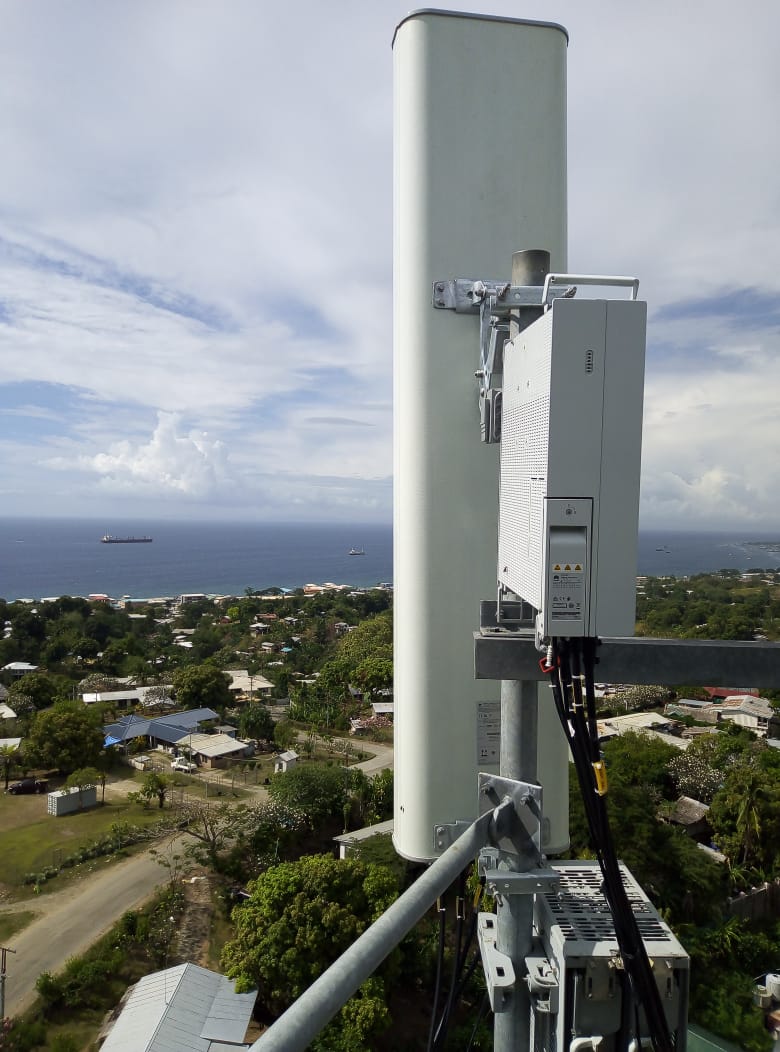(TCSI): The fishing township of Noro is at the center of a strategic rivalry between three local telecommunications companies vying to expand their 4G service to the provinces.
Telekom, Bmobile and SatSol all provide the mobile broadband service to their subscribers in Honiara and have been eyeing expansion to the provinces for some time.
SatSol is rolling out its version of a 4G LTE service in Noro with work on a site there commencing in September this year.
The setup is going through final fine-tuning and is expected to go online by the end of this year.
The move is part of SatSol’s wider push to improve connectivity in the provinces and increase the potential of rural people to access internet based services.
SatSol’s General Manager Anthony Ferris confirmed the Noro installation and added that his company was in the process of installing a similar setup in the Malaitan capital, Auki.
Mr. Ferris said the Auki service is also expected to go online by the end of this year.
But he added that SatSol’s backend setup for its 4G rollout was different from the one currently being used by the country’s two mobile networks, implying more diversity in terms of better security and performance.
Like Bmobile and Telekom, SatSol’s services rely on a combination of satellite based communication links and on connection to the Coral Sea System’s fiber optic cables.
However, the main difference between the telcos is that Telekom and Bmobile are mobile network operators (MNO).
The two mobile service providers have also had their eyes fixed on the potentially lucrative Solomon Islands’ rural 4G market for some time.
Both have earmarked 2020 in their business plans as the year for their 4G forays into the country’s remote areas through the installation of 4G+ LTE capable hardware on their mobile network stations.
Like clockwork, both telcos have recently announced the rollout of their versions of the mobile broadband service to the provinces.
Noro also seems to be the launch point of choice for both mobile network operators in this regard.
The township is strategically important as it hosts Solomon Islands’ second international shipping port as well as large commercial fishing operations such as Soltuna and the National Fisheries Development companies.
The port settlement’s semi-urban status, vibrant large scale commercial activities and location along key shipping lanes that are in close proximity to the Munda international airport makes it an ideal trial environment for new technological advances such as 4G.
Last week, Solomon Islands largest mobile network operator Telekom announced that it has installed 4G+ LTE hardware in Noro and said it intends to expand the company’s version of the service to other rural urban areas.
This week, the company’s Chief Commercial Officer told TCSI that the Noro installation was complete and is now live and going through final fine-tuning.
Mr. Robertson Szetu also revealed that 4G+ LTE installations at Auki and Munda have been completed and were awaiting final integration to Telekom’s 4G network. He added that installation work was progressing for Gizo 4G.
The Telekom Manager said all 4G sites have anticipated launch dates for this month.
Bmobile’s Technical Manager Arvind Autar announced that his company too recently established its 4G+ LTE presence in Noro.
Speaking to TCSI this week, the Bmobile Manager revealed that like Telekom, his company had completed 4G installations in Gizo, Munda and Auki as well and were eyeing a launch date this month.
Bmobile’s additional four 4G sites in the Western and Malaita Provinces means that the mobile network operator now has a total of 10 4G+ LTE sites in country – six of which are located in the nation’s capital, Honiara.
But what is 4G and why all the fuss?
The simple answer is greater bandwidth and higher internet speeds – broadband internet to be more precise.
Fourth Generation (4G) network technology delivers voice, data and texting capabilities through the internet – it is an all internet protocol (IP) standard.
4G technology allows subscribers to access broadband internet while on the go through their mobile devices – a capability previously limited to stationary fixed line connections.
The technology behind 4G is still evolving and improving, hence the suffix LTE that we often see at the end of 4G brands and advertising in Solomon Islands. LTE simply means ‘Long Term Evolution’.
With an ever-increasing demand for data and high-speed internet access, network modernization has become key for the ability of local telcos to offer the best and most seamless experience for their customers.
According to Cisco’s Global Mobile Data Traffic Forecast Update, 4G users typically use three times the data that 3G users typically use.
The 4G+ LTE phenomena is also expected to enable businesses, education and health services in both the public and private sectors to expand their reach to Solomon Islands’ more remote areas.
Better internet deals, more video and music streaming and improved gaming and networking capabilities are also features of the new technology.
Meanwhile, both Telekom and Bmobile have also announced improvements to their 3G networks and services.
Bmobile’s Technical Manager, Arvind Autar told TCSI that Bmobile’s 4G rollout would be coupled with the introduction of the UMTS 900MHz frequency for its 3G service, giving its subscribers better service through improved penetration.
Telekom too is seeking an improvement to its 3G network and service.
But unlike Bmobile, Telekom’s focus seems to be on improving network coverage and critical mass while delivering voice and internet services to its subscribers.
The company revealed that it is currently building five new 3G towers in Makira and five in Choiseul as part of its second Business Transformation Project.
All ten towers are expected to be online by January and February 2021 before the telecommunications company turns its attention to Isabel Province.


